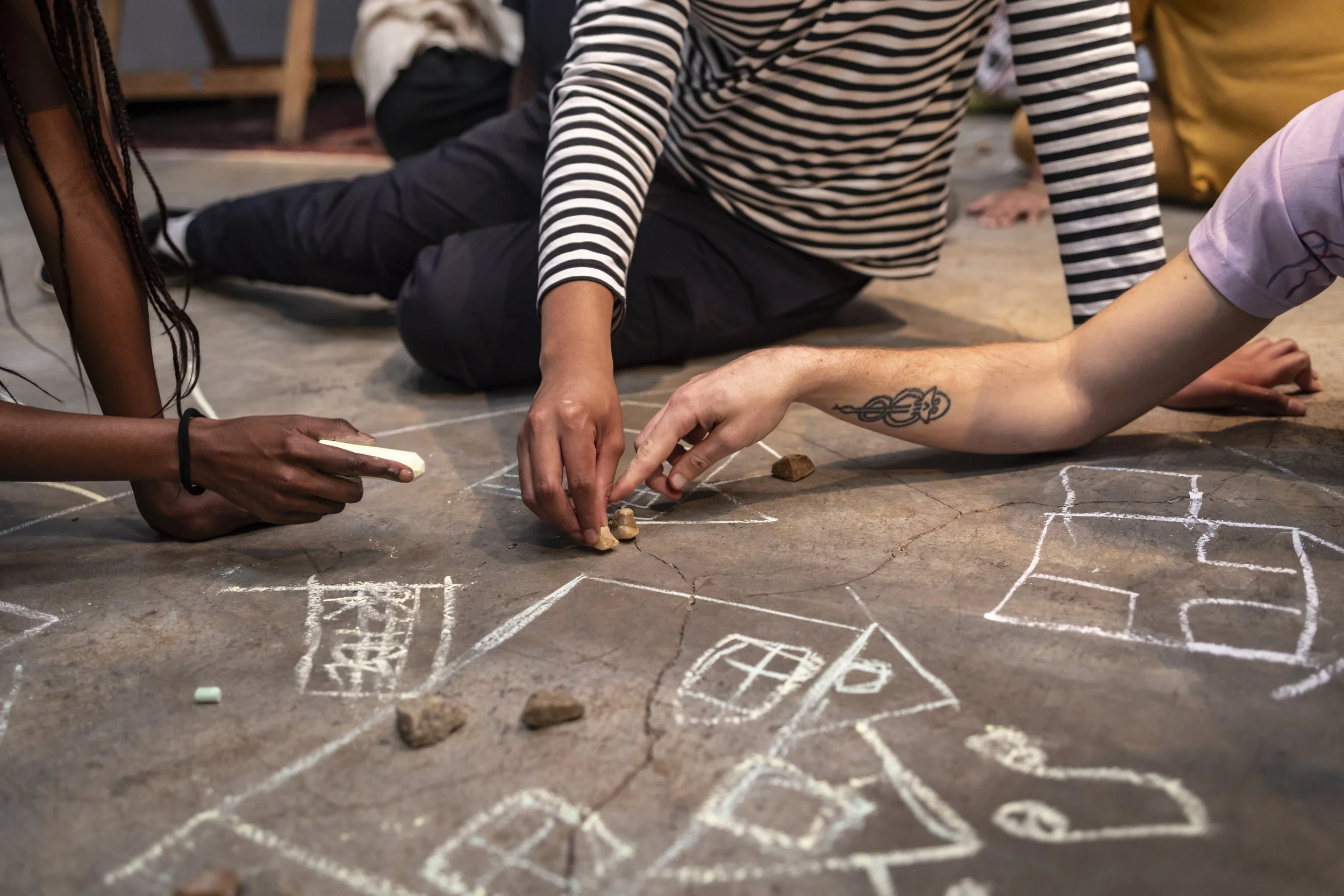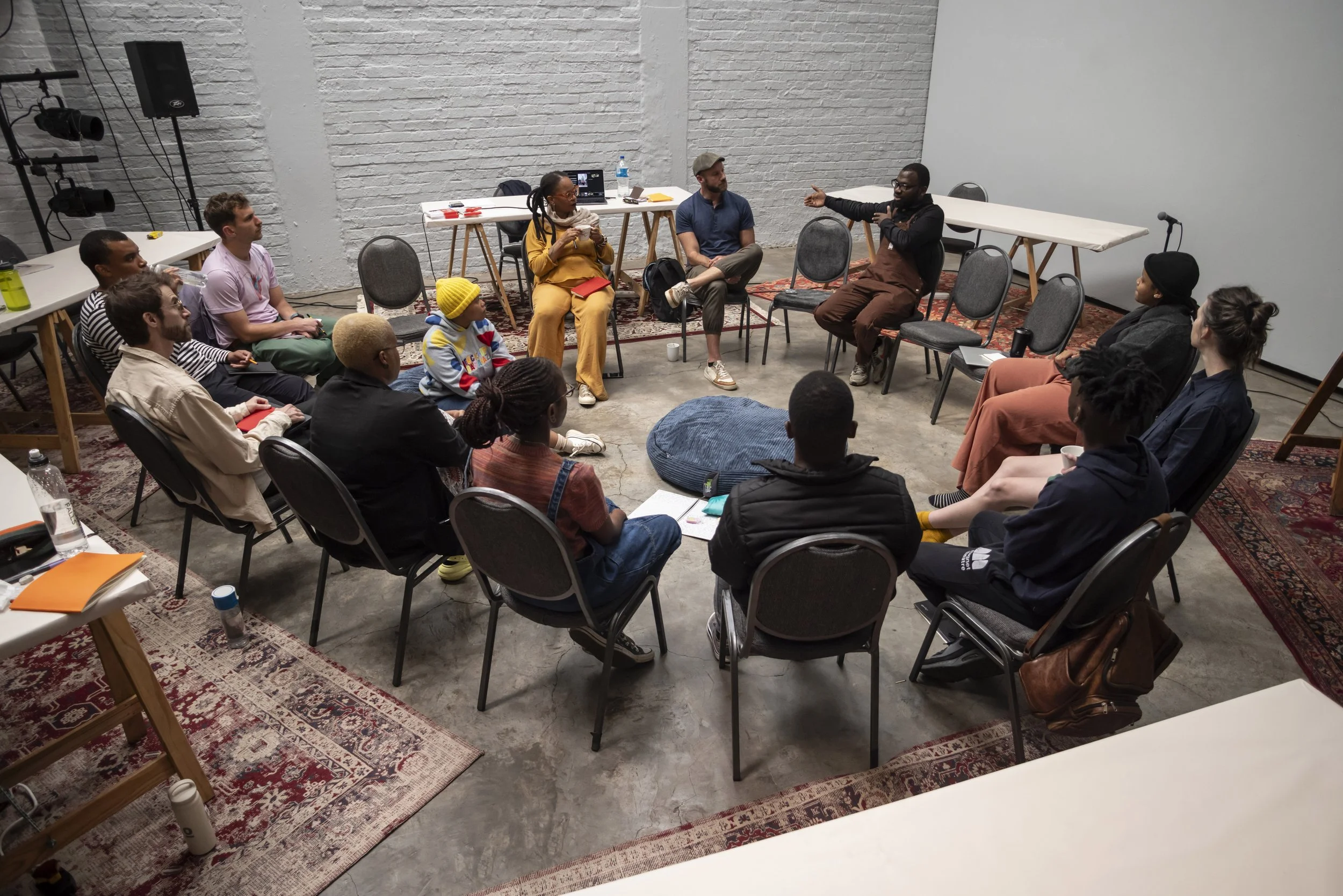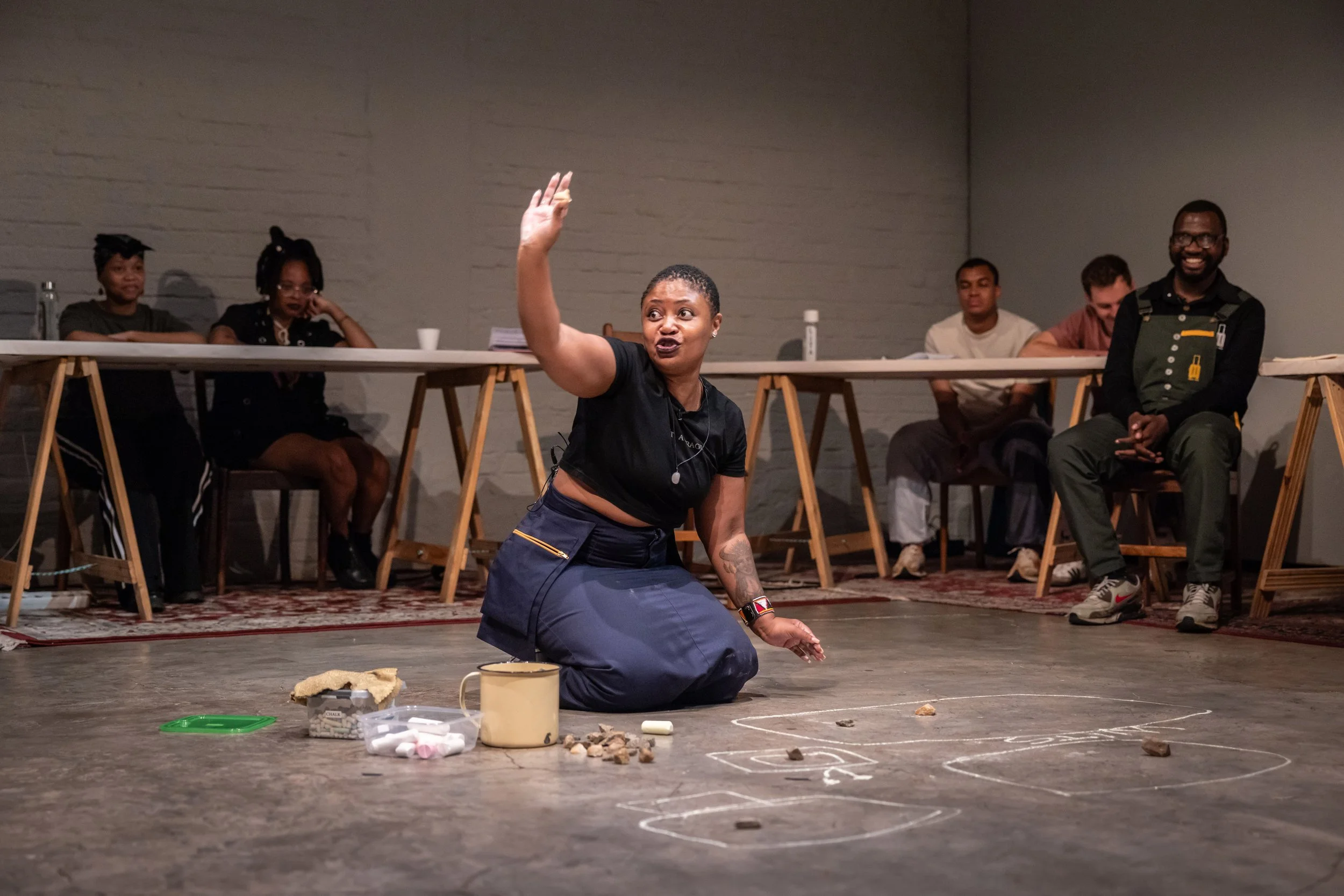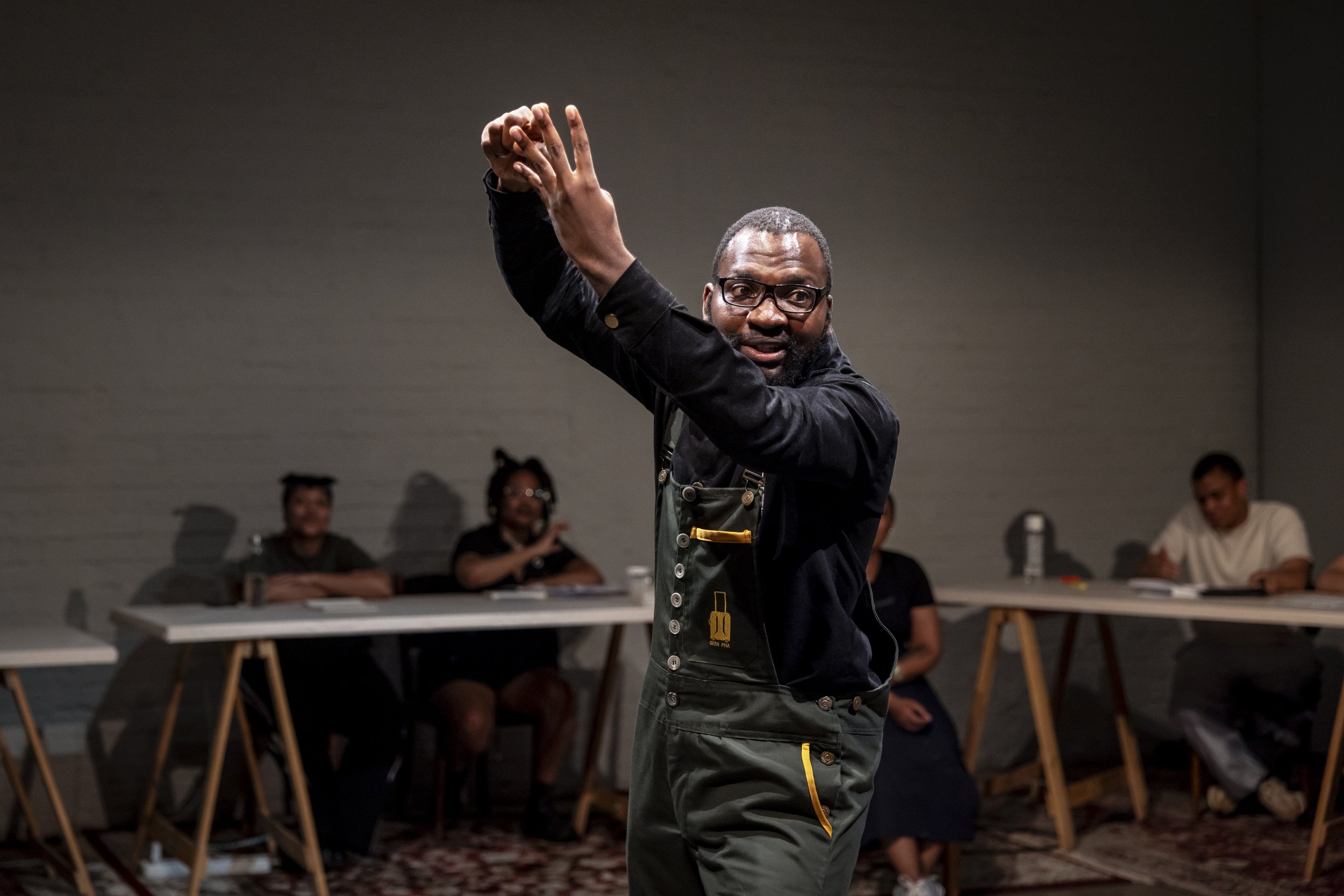THINKING IN WRITING
In 2025, SO | The Academy for the Less Good Idea launched a new series of Thinking In mentorships designed to address the fundamentals of theatre-making, and with the intention to create, incubate and stage new works from scratch.
The first workshop in this series carried a focus on writing.
From 3 to 7 March 2025, The Centre for the Less Good Idea hosted Thinking In Writing, a five-day mentorship led by renowned writers and theatremakers MoMo Matsunyane, Jefferson Tshabalala, and Neil Coppen that culminated in an Open Moment on Friday 7 March.
Ten selected participants – among them visual artists, writers, performers, and cinematographers – entered into a mentorship process led by Matsunyane, Tshabalala, and Coppen, allowing for three unique writing perspectives and approaches.
The Open Moment took the form of a public showing and was an opportunity for the audience to witness and participate in the material and experiments explored throughout the mentorship.
In the months following the mentorship, participants also met with mentors for one-on-one sessions, as well as three peer-review reading circles in order to help shape and develop their texts. This development and feedback phase was held by The Centre’s writer, David Mann, in collaboration with The Centre’s Momenteur, Athena Mazarakis.
RESEARCH AND IMAGING WITH NEIL COPPEN
The first day and a half is led by award-winning theatre maker and co-founder of Empatheatre, Neil Coppen.
Leading with a history of his own practice, as well as that of Empatheatre’s, Coppen presents participants with a view of writing that is inherently research-based and provides a detailed overview of the kinds of research one can adopt, as well as the different contexts from which they emerge.
Coppen’s way of working takes as its premise the understanding that to write is to be in the world, to be in conversation with the people and places you encounter, the things you see. Always, it’s about a deep and constant curiosity, remaining open to stories drawn from traditional news media, mythology, belief systems, oral histories and more.
So, what to do with all of this research? Begin anywhere. While day one had participants unpacking their research topics – a news article about a topic of interest – day two came with an exercise in imaging from Coppen that gets participants to think about their research through five different images. Here, the material that will be taken through the next few days is generated.
GAMES AND PLAY WITH MOMO MATSUNYANE
“Our own ways of understanding the world affect how we communicate, and how we write.” – MoMo Matsunyane
Where Coppen started the workshops off on a process of deep research, and with a starting point in the form of a set of images, MoMo Matsunyane arrives and immediately takes participants into their bodies.
To do this, Matsunyane leads an exercise in storytelling through the childhood game, maskitla. Divided into two groups, participants begin to craft a narrative world, a set of characters, and a plot through the use of chalk and stones. What emerges is a kind of storytelling that is at once improvisational and collaborative. Viewed from above, it also allows one to engage in a form of narrative mapping – putting characters to work inside of a visual narrative and testing how they engage one another, how they move through the world, what kinds of choices they make and how their actions inform the narrative. All of this becomes a uniquely generative way of thinking through a story or a set of characters in an embodied manner.
Similarly, Matsunyane’s exercise in embodying and performing an item of clothing allows one to step into the world, the body, the thoughts and general context of a character, exploring their fears, intentions, their mannerisms and their language. Through these games, as well as other exercises in improvisation and play, Matsunyane prompts the development of a story in an unconscious, inherently collaborative, and organic way.
So, while Coppen’s process helps one gather the research, locate the impulse, the intention of the story and build the world, Matsunyane’s process gets us to step inside that world, physically, and to start growing that world from inside the story.
LANGUAGE AND RHYTHM WITH JEFFERSON TSHABALALA
For Jefferson Tshabalala, the focus is on language. Picking up from where Matsunyane and Coppen left off, he gets participants to land on the level of the sentence and to explore how language rhymes, flows, echoes, and performs.
Central to Tshabalala’s process is exploring how we can play with language. At the same time, he introduces a simple and instructional methodology – the demonstration or introduction of an idea, followed by the act of revealing its structure or pattern, and finally its disruption or resolution. Here, he draws on song lyrics, spoken word poetry, and basic rhyme patterns as a base. “Set yourself a task and give yourself the joy of completing that task,” says Tshabalala.
Another exercise involves writing a short poem about one’s favourite word. Why do words impact us like this, asks Tshabalala? Because language demands meaning, provokes interpretation. We meet the text halfway and we bring our own understanding, perspective, emotion to it. It’s from this engagement that we are able to co-author meaning.
At the culmination of the workshop, participants arrive at The Open Moment with a first draft of a script that’s informed by all of the approaches and exercises introduced by Coppen, Matsunyane, and Tshabalala.
THE OPEN MOMENT
On the evening of Friday 7 March, The Centre presented The Open Moment | Thinking in Writing which showcased the key processes, exercises and creative methodologies from the five-day workshop. Importantly, it also featured excerpts from the writing developed during this time.
While Neil Coppen couldn’t be present, both MoMo Matsunyane and Jefferson Tshabalala demonstrated and contextualised their processes, while The Centre’s writer David Mann provided context on Coppen’s process, linking it to the greater arc and outcomes of the workshop.
Each participant helped demonstrate the relevant exercises and read from their work-in-progress texts.
– David Mann
CREDITS:
MENTORS | Neil Coppen, MoMo Matsunyane & Jefferson Tshabalala
PARTICIPANTS | Vuyokazi Ngemntu, Nolwazi Mahlangu, Uvile Ximba, Thabang Chauke, Mongezi Ntukwana, Melusi Mnqobi Molefe, Chloë Reid, Grace Matetoa, Jessica Sibongile Mathe, Noah Cohen & David Mann
MOMENTEUR FOR THE SO ACADEMY | Athena Mazarakis
All photographs by Zivanai Matangi.



